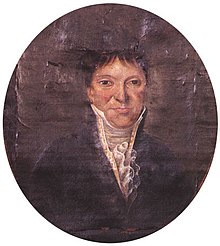Berr-Isaak Berr
Berr-Isaak Berr , more rarely Isaak Berr (* 1744 in Nancy ; † November 5, 1828 in Turique near Nancy), was a pioneer of the emancipation of Jews in France. He was admitted to the French National Assembly as a representative of the Jews of Alsace and Lorraine and was the secular leader of the Lorraine Jews for many decades. Berr was a representative of the Haskala in France and a proponent of Jewish assimilation into the state. In 1807 he was a member of the Great Sanhedrin . In 1816 the French state gave him the title of "de Turique".
Life
Berr came from a wealthy family. Berr's father Isaak Berr was a banker, Berr-Isaak Berr himself owned a tobacco factory. His son Michel Berr was the first Jewish lawyer in France.
As a representative of the Ashkenazim , Berr was one of the supporters of an educational reform and a stronger position of the lay people in the Jewish communities in the disputes over Jewish emancipation in France. Berr-Isaak Berr was one of the leaders of the Jewish community in France, who held their position for an unusually long and continuous period.
In the decisive controversy with the French National Assembly in 1789 , Berr was the spokesman for the Jews in Alsace and Lorraine. Later he was one of the French notables . Following the Declaration of Human and Civil Rights , he presented his thoughts in the Discours . In the work, which was also perceived outside France, he described his hope “that people will recognize us as brothers [...] and that the shameful institutions that enslave us , to be reformed ”.
Until the formal emancipation of the Jews in 1791, Berr resisted giving up the autonomy of the Jewish communities and the abandonment of the control functions that these communities exercised over their members. Among other things, he suggested that Jews should refrain from holding public office if, in return, rabbis and local community leaders were left with jurisdiction over the Jewish communities. Highly controversial within the Jewish community was his position to forego full citizenship in case of doubt if Jewish community autonomy was retained.
In later years Berr-Isaak Berr then propagated the integration of the Jewish population into the French state. He called for a reflection of the Jews on the patrie and a modernization of the Jewish economy and education. After the proclamation of emancipation, he called on the Jews of France to send their children to French schools. After the Jews enjoyed occupational freedom through emancipation , Berr was one of the first to advocate creating training centers for Jewish craftsmen.
Berr-Isaak Berr belonged to the influential minority who tried to bring the thoughts of the Berlin Haskala to France. In the 1780s he was one of a dozen subscribers to the Haskalah magazine Ha-Meassef 1782 he published the French translation of Hartwig Wessely band Divre Shalom ve 'Emet ( "Words of Peace and Truth") to bring reform. The book called for secular culture to be strengthened and for more secular content to flow into traditional Jewish education. He was one of the first pioneers of Jewish assimilation into the majority society, and denied inevitable conflicts between this assimilation and the preservation of Jewish identity.
literature
- Ulrich Wyrwa: Jews in Paris and Berlin. For reporting on the French Revolution in Berlin newspapers and magazines (1789–1791) . In: Aschkenas , Volume 13, Issue 2, July 3, 2004, Max Niemeyer Verlag, ISSN 1016-4987 , pp. 425-439. doi : 10.1515 / ASCH.2003.425 .
- Paula E. Hyman: The Jews of modern France . University of California Press, Berkeley 1998, ISBN 0-520-20925-7 . (English)
- Frances Malino: A Jew in the French Revolution. The life of Zalkind Hourwitz . Wiley-Blackwell, Oxford 1996, ISBN 1-55786-193-5 . (English)
- Jay R. Berkovitz: The shaping of Jewish identity in nineteenth-century France . Wayne State University Press, Detroit 1994, ISBN 0-8143-2012-0 . (English)
- Isidore Singer, Isaac Broydé: BERR ISAAC BERR OF TURIQUE. In: Isidore Singer (Ed.): Jewish Encyclopedia . Funk and Wagnalls, New York 1901-1906.
- Heinrich Graetz : History of the Jews from the oldest times to the present. Fourth period, first period, 5th / 6th centuries Chapter . Leipzig 1900. ( digitized online at Zeno.org )
Web links
- Lettre de M. Berr Isaac Berr from 1791 (French)
Individual evidence
- ↑ a b c d Berkowitz p. 70
- ↑ Berkowitz p. 132.
- ↑ Malinho p. 57.
- ↑ Malinho p. 75.
- ↑ Berkowitz p. 89
- ↑ Hyman p. 31
- ^ Jacob Katz: Out of the ghetto: the social background of Jewish emancipation, 1770-1870 Syracuse University Press, 1998 ISBN 0-8156-0532-3 p. 183.
- ↑ Hyman p. 13.
| personal data | |
|---|---|
| SURNAME | Berr, Berr-Isaak |
| ALTERNATIVE NAMES | Berr, Isaac |
| BRIEF DESCRIPTION | Champion of the emancipation of Jews in France |
| DATE OF BIRTH | 1744 |
| PLACE OF BIRTH | Nancy |
| DATE OF DEATH | November 5, 1828 |
| Place of death | Turique near Nancy |
